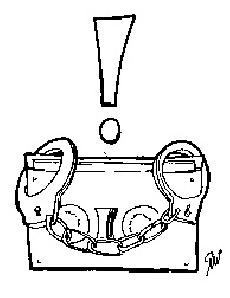Staff editorial: Renewing the public’s trust

Illustration
Sep 16, 2004
Last updated on May 11, 2016 at 03:43 p.m.
In Champaign, Martel Miller and Patrick Thompson have been charged with eavesdropping on police officers who were making routine traffic stops. The two men are co-founders of a group called Citizen’s Watch, whose goal is to videotape and monitor local police. According to police, what is at issue is the audio content of the videotapes, rather than the video itself.
Eavesdropping laws are in place to protect the privacy of citizens, but Illinois law is unclear about what conversations are deemed private and also, which types are illegal. We believe the defendants are in the right, and hopefully this case could help make the law clearer.
Moreover, the police perform a public service, and it doesn’t make sense for them to be protective of their on-duty actions.
Miller and Thompson were planning to include the footage in a documentary comparing and contrasting police treatment of different racial and ethnic groups. It was meant for educational purposes, and was developed for public television.
Get The Daily Illini in your inbox!
Before filming began, the two men notified police, the city and the mayor of their project. However, they did not inform them of the methods, specifically videotaping, that they would be using to monitor law-enforcement officers.
And while we understand the reaction police would have to observers who might distort or misrepresent their actions, the police should have to understand that transparency and accountability for their actions as public protectors and state employees is crucial.
It shouldn’t matter whether on-duty police are being observed or monitored. The police should be expected to act as professional and ethical as possible regardless of who’s watching.
Monitoring public servants and officials should not be discouraged. By charging these men with eavesdropping, the city sends a devastating message that it’s not OK for community programs, such as Neighborhood Watch, to enforce their own checks and balances.
Rather than react negatively to citizens who wish to independently monitor law enforcement, the police should drop these charges and address the issues that motivated these men to monitor them in the first place. Maintaining the goodwill of communities is important. This is an opportunity for the police to renew the public’s trust.





